constituent assembly of india debates (proceedings)- volume vii
constituent assembly of india debates (proceedings)- volume vii
constituent assembly of india debates (proceedings)- volume vii
Create successful ePaper yourself
Turn your PDF publications into a flip-book with our unique Google optimized e-Paper software.
In the second place, it is wrong to say that fundamental rights in America are absolute. The<br />
difference between the position under the American Constitution and the Draft Constitution is one <strong>of</strong><br />
form and not <strong>of</strong> substance. That the fundamental rights in America are not absolute rights is beyond<br />
dispute. In support <strong>of</strong> every exception to the fundamental rights set out in the Draft Constitution one can<br />
refer to at least one judgment <strong>of</strong> the United States Supreme Court. It would be sufficient to quote one<br />
such judgment <strong>of</strong> the Supreme Court in justification <strong>of</strong> the limitation on the right <strong>of</strong> free speech<br />
contained in Article 13 <strong>of</strong> the Draft Constitution. In Gitlow Vs. New York in which the issue was the<br />
constitutionality <strong>of</strong> a New York "criminal anarchy" law which purported to punish utterances calculated to<br />
bring about violent change, the Supreme Court said:<br />
"It is a fundamental principle, long established, that the freedom <strong>of</strong> speech and <strong>of</strong> the press, which is secured by the Constitution, does<br />
not confer an absolute right to speak or publish, without responsibility, whatever one may choose, or an unrestricted and unbridled license<br />
that gives immunity for every possible use <strong>of</strong> language and prevents the punishment <strong>of</strong> those who abuse this freedom."<br />
It is therefore wrong to say that the fundamental rights in America are absolute, while those in the<br />
Draft Constitution are not.<br />
It is argued that if any fundamental rights require qualification, it is for the Constitution itself to<br />
qualify them as is done in the Constitution <strong>of</strong> the United States and where it does not do so it should be<br />
left to be determined by the Judiciary upon a consideration <strong>of</strong> all the relevant considerations. All this, I<br />
am sorry to say, is a complete misrepresentation if not a misunderstanding <strong>of</strong> the American Constitution.<br />
The American Constitution does nothing <strong>of</strong> the kind. Except in one matter, namely, the right <strong>of</strong> <strong>assembly</strong>,<br />
the American Constitution does not itself impose any limitations upon the fundamental rights guaranteed<br />
to the American citizens. Nor is it correct to say that the American Constitution leaves it to the judiciary<br />
to impose limitations on fundamental rights. The right to impose limitations belongs to the Congress. The<br />
real position is different from what is assumed by the critics. In America, the fundamental rights as<br />
enacted by the Constitution were no doubt absolute. Congress, however, soon found that it was<br />
absolutely essential to qualify these fundamental rights by limitations. When the question arose as to the<br />
constitutionality <strong>of</strong> these limitations before the Supreme Court, it was contended that the Constitution<br />
gave no power to the United States Congress to impose such limitation, the Supreme Court invented the<br />
doctrine <strong>of</strong> police power and refuted the advocates <strong>of</strong> absolute fundamental rights by the argument that<br />
every state has inherent in it police power which is not required to be conferred on it expressly by the<br />
Constitution. To use the language <strong>of</strong> the Supreme Court in the case I have already referred to, it said:<br />
"That a State in the exercise <strong>of</strong> its police power may punish those who abuse this freedom by utterances inimical to the public welfare,<br />
tending to corrupt public morals, incite to crime or disturb the public peace, is not open to question. . . . . "<br />
What the Draft Constitution has done is that instead <strong>of</strong> formulating fundamental rights in absolute<br />
terms and depending upon our Supreme Court to come to the rescue <strong>of</strong> Parliament by inventing the<br />
doctrine <strong>of</strong> police power, it permits the State directly to impose limitations upon the fundamental rights.<br />
There is really no difference in the result. What one does directly the other does indirectly. In both cases,<br />
the fundamental rights are not absolute.<br />
In the Draft Constitution the Fundamental Rights are followed by what are called "Directive<br />
Principles". It is a novel feature in a Constitution framed for Parliamentary Democracy. The only other<br />
constitution framed for Parliamentary Democracy which embodies such principles is that <strong>of</strong> the Irish Free<br />
State. These Directive Principles have also come up for criticism. It is said that they are only pious<br />
declarations. They have no binding force. This criticism is <strong>of</strong> course superfluous. The Constitution itself<br />
says so in so many words.<br />
If it is said that the Directive Principle have no legal force behind them, I am prepared to admit it.<br />
But I am not prepared to admit that they have no sort <strong>of</strong> binding force at all. Nor am I prepared to<br />
concede that they are useless because they have no binding force in law.


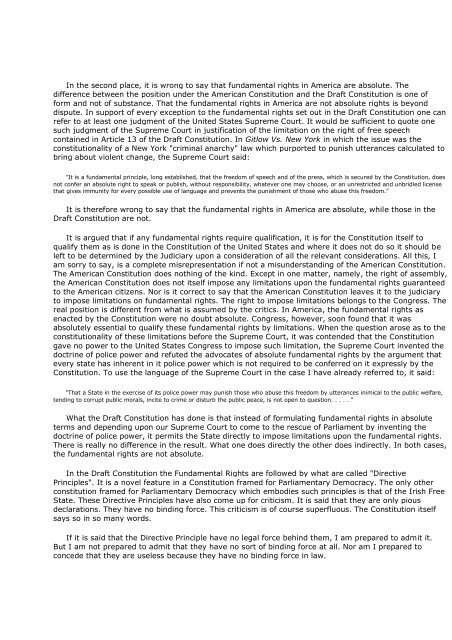
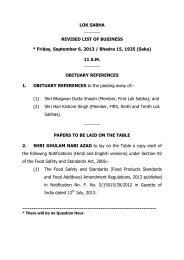
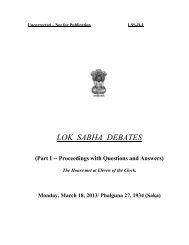
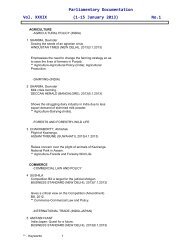
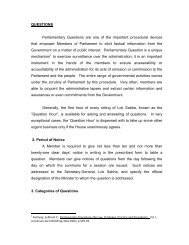
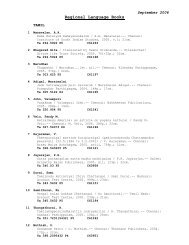
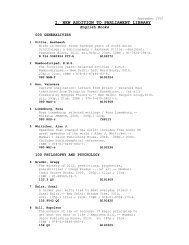
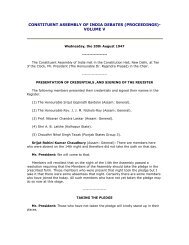

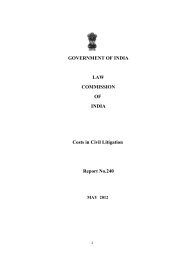
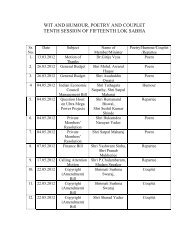
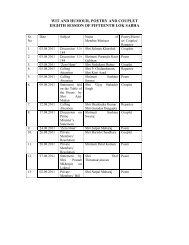

![gÉÉŌ A.]ÉŌ. xÉÉxÉÉ](https://img.yumpu.com/8015720/1/190x245/geeo-aeo-xeexee.jpg?quality=85)
